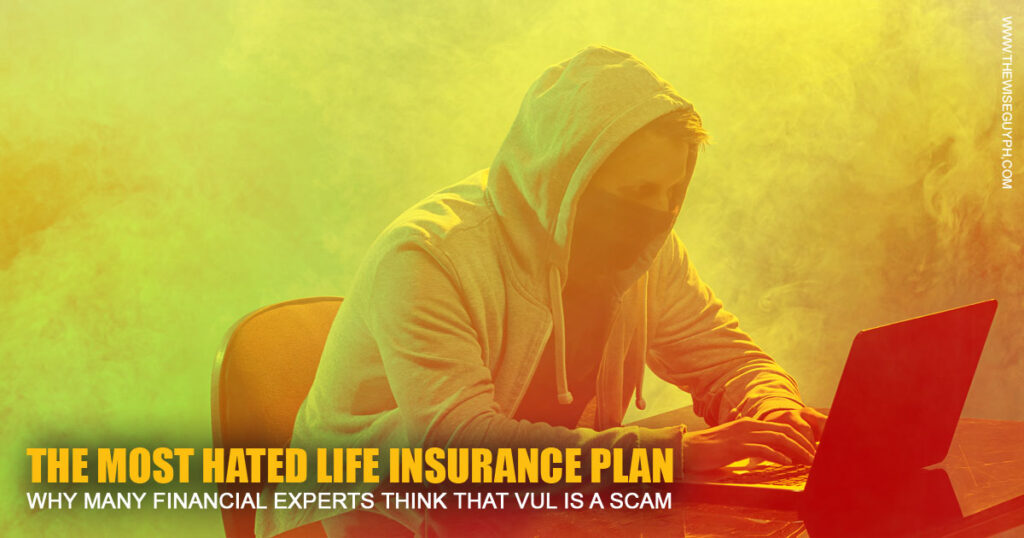
Many financial experts hate the VUL plan, and some may even tag it as a scam. If you’re following one of them, They will convince you that it is. And I can’t blame you. But don’t get me wrong. This article will not refute their claims or support them. I just had an urge to explain some things that are also important in your decision-making. So put down your pen and read this before you sign your insurance application.
READ: Top 10 Life Insurance Companies in the Philippines
First, I’d like you to know that I did not write this out of hate toward anyone. However, someone triggered me to write this article.
Oh no! It’s not any of those financial experts you’re following. It’s someone I don’t even know.
Not that I hate him. But you’ll know why in a bit.
Table of Contents
I Hate VUL It’s A Scam!

A few days ago, I was shocked to receive a hate comment. Oh well, it’s not my first. Sometimes we have different views, and that’s fine. There might be corrections in my post, and you’re more than welcome to tell me.
However, the attack was personal, mocking my story of why I got life insurance.
Like, seriously, am I not allowed to share my story because it’s not what you’re looking for?
Then at the end of his comment, he shared how disappointed he was when he learned about the charges. He felt scammed and thought that every insurance agent was a scammer.
Mind you. I’m not ready to receive hate for something I didn’t even do.
So if you have the same experience or perspective, then this is what you should do.
Go to your insurance agent if you have issues. It’s not right to vent your anger on someone who doesn’t know you. If you can’t resolve it, then that’s the time to look for someone who can help you.
In his comment, it seems he didn’t know about the charges. Instantly I can say that both of them are at fault. Firstly, insurance agents must be transparent. Secondly, the clients must do their due diligence.
Thanks to him, this post is born.
I hope you’re reading this. And hopefully, it may help you.
But most importantly, I won’t turn a blind eye to the fact that several VUL holders feel the same way, especially when they have watched videos about BTID like it’s the perfect insurance plan. Now, they will hate it to its core from the charges, insurance company, advisor, name it, they’ll hate it.
Three Sides of the VUL Plan

First, I will not make you fall in love with VUL because it’s not for everyone. Here’s what I’d like you to know.
Like Robert Evans said, “There are three sides to every story: your side, my side, and the truth.”
So in this much-heated discussion, there are also three sides. These are the views of financial experts, insurance agents, and the client.
Okay, you have heard, read, and watched about the side of financial gurus/experts.
Now, it’s time to know the side of an insurance agent.
BTID is the BEST Strategy
I hope you’ll agree that many who hate VUL will recommend the BTID strategy.
Term insurance is way cheaper and can give higher coverage with fewer charges.
In addition, Warren Buffet said that you should get an investment with low fund management fees. It makes sense because lower management fees mean a higher percentage of your money is invested.
These are just a few things they say about the BTID strategy.
Who doesn’t want cheaper options, right?
If I’m just a client and my first time hearing this, I agree that BTID is the best.
But it’s not. Here’s why.
5 Additional Truths about the BTID

Again, I’d like to emphasize that I agree with the points presented by the financial experts you’re following. But I also believe that there are more truths you must also know. So here they are.
1. It’s more complex than you thought
“Do you have BTID plans?” That’s the most common question I get from those interested in BTID. And it seems to me that they don’t understand it at all.
In layman’s words, BTID means you buy term insurance and invest on your own. Thus, it’s cheaper because you’ll do it yourself.
Term insurance bundled with an investment of any form should never be called a BTID plan. It’ll never exist as it defeats the true purpose of the strategy.
Here’s an example to help you visualize what you’re about to do.
If you need house repairs, let’s say you have a broken faucet, then you have two options. It’s either you hire a plumber or fix it on your own.
Of course, when you do it on your own, it is cheaper. However, if you don’t know how to do it properly, you might do more harm than good.
Not because others can fix faucets mean that you should. They can tell you it’s cheap, they can tell you it’s doable, and they’re right. But you should not feel bad if you can’t do it now.
You can still get a plumber to fix it in the meantime. Then study or ask someone you know to help you in learning it. So next time it happens, you can do it yourself.
Somehow, BTID is the same.
If you know how to manage your investments, then go to BTID.
If not, go and get professional help. Delegate it to someone who knows better than you, for example, by getting a VUL plan.
You still have time to learn how to fix faucets and much more to handle your investments.
And by the time that you’re ready, I’m sure you’re not starting from scratch.
2. You will never get away from charges
There’s no such thing as free lunch. When you get term insurance, 100% of your payment goes to charges such as premium charges and the cost of insurance. And you should be okay with it because that’s how term insurance works. That’s why it’s cheap.
But still, several people cannot get a hold of it. They say, “You mean even if I paid it for 20 years? I won’t get anything in return?”
In the back of my head, I would like to tell them, how sure are you that you’ll survive 20 years or even just ten (10) years? There’s no certainty with that. Of course, I didn’t say that. Okay, I think I did to my friends, haha!
So when you tell them about it, they are drawn back as if it was never explained by whoever they’re following. Oh, I’m pretty sure it’s there.
Term insurance is used for income protection to cover death. The client pays the extra cost for added benefits like savings. You don’t want that if you want to follow the BTID strategy.
Thus, the VUL plan is more expensive.
In addition, when you invest in other investment vehicles, you will still be exposed to charges.
Maybe at a lower rate. We call it differently, such as transaction fee, clearing fee, commission, value-added tax, gain tax, management fee, account fee, marketing and distribution fee, etc.
Hence, you cannot get away from charges.
3. There’s no guarantee that you’ll invest the difference
Let’s say you saw an explainer video about the BTID. In that example, the VUL plan is Php 50,000 per year, while it’s only a Php 15,000 annual premium for term insurance.
If you follow the BTID strategy, you’ll buy term insurance for Php 15,000 and invest the remaining Php35,000 in an investment vehicle of your choice.
In BTID, you allocate more funds to invest in the early years. Thus, it will result in a much bigger fund.
The gap between it and the funds of a VUL plan will become significant as time goes by. But let’s park it for now.
There are two points I would like to stress.
Firstly, would clients go the extra mile to get VUL and term proposals? So they’ll know the difference or the amount they’ll invest?
If yes, I can tell you that most clients will settle to lower cash out. And that’s fine. However, it will again defeat the purpose of the strategy.
Because instead of paying the Php 50,000 from the example above, some will settle for Php20,000 or Php 25,000.
It will result in a lower allocation to investment. Thus, you’ll get lower accumulated funds than getting the VUL plan.
Secondly, it might become spend the difference.
Paying your insurance policy is like settling your electric bill. You need to pay before the grace period ends.
It’s something you don’t want to happen with your electricity, much more with your insurance policy.
However, your investment is not the same. You’re not required to put in additional funds. Thus, giving you an idea to skip it from time to time.
So from investing the difference, it might become spending the difference. A total nightmare, I must say, if not correctly done.
4. Ideal vs. Reality
Whenever I watch financial experts on Youtube, I notice that they make BTID look very easy to do.
Just to set the record straight, I watch it to keep myself updated. I believe in continuous learning.
I don’t leave hate comments because I’m not a hater. So please spare me from hate.
As I always tell my readers, I have term insurance because it’s cheap and gives me higher coverage.
I find it too ideal.
They say that term insurance is cheap, so only get term insurance. Then invest your money elsewhere, for example, Pag-IBIG MP2.
Once they show figures and illustrations, it will add some awe factor. And now viewers like you are convinced.
But the problem is it’s too sugar-coated, and they don’t discuss some factors that can influence your decision.
The reality is that they are already experts in their fields. And you might not be on the same level as them.
They know how to do it, so it’s why their results are above average.
Sure, you can get term insurance.
On the other hand, investing is not as easy. But it’s not too hard. You can look for several online resources to equip you with the proper knowledge and mindset.
READ: Sun Fit and Well | A Comprehensive Health Insurance
Just make sure to know how it works before investing, or else it will become more of a gamble.
Investing entails knowledge. And it pays the best interest. If you plan to do BTID, do not skip studying. It’s the key determinant of your success.
5. Term insurance or terminated insurance?
You already know that term insurance is cheap. But do you know why it’s cheap? You might tell me that it’s because it only covers death.
That’s correct.
In addition, term insurances are usually terminated or expired before any death claim.
Which only means that there are only a few paid death claims. Because the policy owner did not renew the contract or it lapsed.
In this setup, insurance companies have less risk over term insurance. Thus, they can offer it for a cheaper price tag.
But that’s not the case for whole-life or VUL plan owners.
VUL plans provide life insurance coverage for life. Thus, insurance companies pay more claims.
READ: Sun Life is the Top Life Insurer in the Philippines
It exposes them to higher risks, which makes VUL expensive.
As an insurance agent for five (5) years, I witnessed the termination of term insurance. Most of my clients who availed of term insurance terminated their policies after two years.
And some even terminate it just after a year.
Lastly, as insurance agents, we are encouraged to bring quality business to the company.
Clients that stay are always desirable. If clients terminate their plan in a year, it will correspond to a financial loss.
Of course, bringing subpar business is not sustainable. It can soon hurt the financial stability of the company. Which, at all costs, we must avoid.
5 Additional Truths about VUL

At this point, you might be thinking that I’m pro-VUL. But let me tell you that I’m not. I’m a pro-client.
I’ll support you whatever floats your boat.
If this topic interests you, I think it’s better to know the bitter truths than the sweet lies.
Okay!
So I can balance everything, I will also be straightforward and blunt with my views about VUL.
Here are the five (5) additional truths you must know about VUL.
1. Unforeseen advantages of VUL plans
Most insurance agents will say that VUL is a 2-in-1 plan. And that includes me. Others might even say that it’s a 3-in-1 plan.
You know, it’s just a matter of time before it’ll be called the “All-In-One” plan.
But kidding aside, technically, there’s nothing wrong with it.
However, there are several unforeseen advantages of VUL plans that you may not get by doing BTID.
Firstly, the tax advantage.
In VUL, a capital gains tax of 20% does not apply to your investment funds.
So if your capital is Php 1,000,000 and you earned Php 100,000 as interest. The tax will be Php 20,000 deducted from your earnings.
Thus, the more you earn, the higher your taxes.
But wait.
It doesn’t mean you’re 100% exempted from tax because there’s still VAT against the fund management fee.
That’s 12% of the 2% management fee.
Still a huge difference in taxes, right?
In addition, if you die, your beneficiaries may get the sum assured plus the “investment fund” tax-free.
That’s because your investment fund will form part of your insurance coverage.
Secondly, the waiver on premiums in your VUL plan enables you to save when you cannot produce income.
In BTID, a big chunk of your money goes to a pure investment vehicle. So what happens when you get disabled?
Your term insurance coverage continues, provided that you have a waiver of premiums attached to your plan.
But that’s not the case with your investment in BTID.
I guess that’s another reason to diversify by getting a VUL plan.
Thirdly, it gives increasing life insurance coverage.
As mentioned, most VUL plans death benefit is the sum of insurance coverage and investment fund.
So as your investment grows, the insurance coverage increases accordingly.
2. VUL is not the most expensive insurance after all
I’ve read several forums wherein they would say that VUL is costly. Compared to term insurance, it is.
Some would even say that most insurance agents sell it because they want to earn more.
But technically, if they are only after the commission, it would only make sense to sell the most expensive plan.
Guess what?
VUL is not the most expensive type of insurance, after all.
Whole life insurance is more expensive because of insurance protection and guaranteed savings.
In this plan, the insurer guarantees the savings. Even a stock market crash will not affect the savings fund.
For this type of insurance, the insurer takes all the risk. The accumulated savings are usually smaller to limit their risk exposure.
On the other hand, VUL is a combination of insurance protection and investment fund.
But take note investment returns in VUL plans are not, or should I say it’s not guaranteed.
Again, because an investment fund is not guaranteed, it simply means that insurance companies have less risk exposure.
In VUL, the client gets more risk associated with the investment fund.
Hence, VUL is at a more affordable price compared to whole-life policies.
Is it bad? Not at all. In any investment, the risk is always with the investor.
Lastly, there are three types of VUL plans, i.e., regular-pay, limited-pay, and single-pay.
In most cases, they compare BTID with a regular-pay VUL.
But why?
I think it’s because it has higher charges compared to a limited-pay VUL.
These limited pay VUL plans are the improved version with higher and more sustainable fund accumulation.
3. The fund management fee can be okay too
In VUL plans, the investment is in the form of pooled funds. It’s somewhat similar to a mutual fund.
And most, if not all, BTID practitioner hates the fund management fees of VUL plans. They recommend investing on your own to skip the management fees.
It simply means you get more money in your funds. And they’re right.
But it’s only applicable if you know how to do it. It’s not that I’m telling you, you can’t learn it. Because you obviously can.
However, there’s nothing wrong if you delegate. Let’s say in cases you cannot do it yourself now. But of course, it means you have to compensate them.
That’s in the form of fund management fees.
For example, you have more important things to deal with at hand. Like, if you are taking your master’s degree or preparing for a board or bar exam.
While some decide to focus on what they do best, like in work or business, it is, by all means, subjective depending on which you think would work for you.
Thus, you’re not lazy if you get a VUL plan. It’s just that you have priorities. It might not get you from point A to point B as fast as BTID. But you know that you’re moving rather than not even start investing altogether.
Thus, it’s perfectly okay to get a VUL plan.
After all, it’s an insurance plan. The investment part is something to look forward to but should not be the sole reason for getting it.
READ: 5 Steps to Achieve Financial Freedom
Lastly, investing doesn’t end in getting a VUL plan. I guess it’s time to change your insurance advisor if they keep telling you that VUL is an investment plan.
4. This is why you hate your financial advisor
I couldn’t agree more with financial experts hating most insurance advisors, especially those who make VUL look like a God’s gift to everyone.
It’s not the best plan.
But VUL is not a scam. Just the same views I have with term insurance. For me, it’s not the best plan either.
In reality, the best, or should I say “the right,” plan for you is the one that can help you secure your future and help you achieve your goals. Just the way you like it.
Insurance is not a one size fits all plan.
We have different needs, and not because it doesn’t fit your needs means it’s less superior.
I can’t blame you if you hate your advisor. That’s why we keep on telling you to do your due diligence. Please, don’t ever get an insurance plan you don’t understand.
And don’t just ask for proposals, for Pete’s sake. You will miss more information that you cannot see in the proposal in the first place.
Financial planning is FREE and available online, so maximize it.
READ: 5 Steps in Getting the Right Insurance Plan
An insurance plan is for your future and a long-term obligation. So give some time to have a sit-down discussion. On top of it, you can get answers right there and then. Thus, it saves you time.
Lastly, do not get an insurance plan to help a friend.
Just help your friend in some other ways. Because, in reality, you’re not helping your friend grow by accommodation sales.
You don’t like the plan at the beginning, and soon after, you might terminate it, which is a total waste of your time and money.
5. Advisors earn through commissions
The ultimate reason why some clients feel that VUL is a scam is the commissions.
It’s one of the frequent contents of financial experts. Most of them think that it’s all about the commission and why insurance agents are pushing VUL plans.
Again, if you read this, you will understand it’s not.
Mind you. The commission rate will depend from plan to plan and company to company. And would you believe that some term insurance plans give a much higher commission rate than a VUL plan?
Because the premium of VUL plans is higher due to added benefit, i.e., investment fund, even if the rate is less, the resulting commission will be higher.
At this point, you might think that your advisor took advantage of you by not telling you the commission.
Let me say this, for once and for all, we, insurance agents, are not allowed to say the rate or actual commission earned to a client.
We can only say that we earn thru commissions.
So please stop the hate. We are just trying to stay ethical by following the mandate of the Insurance Commission. After all, this is a job.
You know this is just a short explanation.
There’s so much I would like to share about this, but it’s getting longer. I’ll write another article about it and link it here once done.
Final Thoughts
We can’t discuss this topic without feeling aversion. And it’s kind of sad. Why do we have to spread hate? But setting it aside, one thing is undebatable.
You need life insurance!
I started this article by telling you that this is my view as an insurance agent. Before you type your hate comment, please read the whole article first. So we can have a healthy discussion.
Once again, I will not make you fall in love with VUL or even like it. Just like you, I don’t think VUL is “the almighty” insurance plan. However, term insurance is not the best insurance as well.
What I’m trying to say is that not because it’s working for them means it will work with you. It may or may not. In the end, it is something you have to decide for yourself.
You’ll be the one paying for it, not those financial experts or your insurance agent. So please do your due diligence. Take both sides with a grain of salt.
Of course, they will always prove their side.
How do you like your ice cream?
You know, I always compare this topic to ice cream. Well, aside from I like it to beat the heat. It best describes the different views we have between BTID and VUL.
In my case, I like vanilla ice cream. I enjoy its simplicity and the taste of sweet-creamy vanilla. On the contrary, my family prefers anything but vanilla ice cream. Sometimes I don’t understand why.
It’s the same tension between BTID and VUL.
Sometimes, we can’t understand other people because we fail to put ourselves in their shoes.
Put it this way.
Some prefer plain and basic term insurance, while some would want extra toppings such as riders and customize their plan with VUL.
Thus, no plan is superior to the other.
Either plan can be right for you.
Writing this ultra-long article makes me feel I deserve some ice cream. If you want to send some, please send the money to my GCash account (09177758352).
So here’s the thing.
We have different needs, distinct financial goals, and might have different time frames.
We are all different.
Aren’t we?
*****
Ton is an electronics engineer, financial blogger, insurance agent, and a certified investment solicitor. A multi-awarded financial advisor with clients ranging from lawyers, doctors, engineers, accountants, business owners, company directors, and OFWs to minimum wage earners had sought advice from him in achieving lifetime financial freedom.

4 thoughts on “10 Truths About BTID And VUL Financial Experts Won’t Tell You”
Magiging mas mura ang mga insurances at invesment vehicles kung mawawala na ang mga “Financial Advisors”. Hindi ba puwedeng straight na lang ako kumuha sa insurance companies and banks, that way, wala kayong kukunin sa aming 10-40% commission? Ngayon, sasabihin mo, walang magpo process ng papers mo, may value pa rin na binibigay ang mga “FA”, walang mag eexplain sa’yo, etc. Puwede naman sa insurance companies na ‘yon lahat, ‘di ba? But ginawa lang ng mga kumpanya na ‘to ang “Financial Advisor” role, para madali sila makapag benta ng insurance. Why? E kasi, kakilala mo yung nagbebenta e. So, para mas marami maibenta na insurances itong mga company na ‘to, gumawa sila ng networking scheme (thru “FA role”) na mas nagpataas pa ng binabayaran mo sa insurance.
TL;DR: Mas nagmahal ang mga insurance dahil gusto ng mga companies makabenta ng mas marami, dahil sa middle man na “Financial Advisors”.
Too sad, you didn’t even read, and you’re targetting us with your hate. As I mentioned, do talk with your agent to clear things out. If you are not ready to listen, the problem might be something else.
I agree and disagree with your statements. I agree that somewhat, commissions are a large portion of insurance charges. But you missed other things as well. Didn’t you know that you can avail insurance plan with almost any bank?
Did it become cheaper?
They might be paying lesser or no commissions, but why is it not as cheap as you think? Because the budget for commissions will only be redirected to other forms of marketing.
Remember, life insurance companies are doing business. And “sales” is the life and blood of any business.
Just think of it, how many will line up with any life insurance company to purchase life insurance? I bet you even learned about insurance with your family or peers, who might be insurance agents.
You are undermining the role of agents in general. Again, no explanation will suffice a person’s hatred at this level.
However, I wish you all the best and hope you find peace in life. Ty.
i like your article sir. Nice point of View. ^_^
Thank you, Paul!